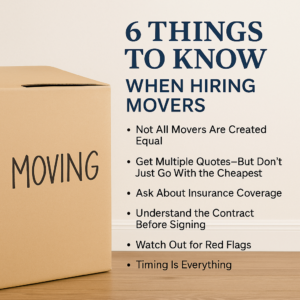
Hiring movers can make your life a lot easier—or a lot harder—depending on who you choose. After 37 years in sales and helping buyers and sellers across the West Coast of Florida, I’ve seen my fair share of moving day disasters and victories. Whether you’re upsizing, downsizing, or relocating to a new area, knowing what to look for in a moving company can save you time, stress, and even money.
Here are six things you need to know before you hire movers:
1. Not All Movers Are Created Equal
Just like in real estate, reputation matters. Start with referrals from friends, family, or your Realtor (hi, that’s me!). Check online reviews, but don’t rely only on star ratings—read the comments to spot patterns like damaged items or missed timelines. Look for companies that have been in business for several years and are licensed and insured.
For moves within Florida, the company should be registered with the Florida Department of Agriculture and Consumer Services. If you’re moving across state lines, they must be registered with the U.S. Department of Transportation. You can verify their license at www.protectyourmove.gov.
2. Get Multiple Quotes—But Don’t Just Go With the Cheapest
It’s tempting to go with the lowest price, especially with all the expenses tied to moving. But like anything, you get what you pay for. Some low-cost movers add surprise fees later, or they may not have the training or equipment to handle your items properly.
Request written estimates from at least three companies. Make sure they come to your home (or do a detailed video call) so they understand exactly what they’re moving. Avoid companies that give you a quote based only on a quick phone chat with no inventory check.
3. Ask About Insurance Coverage
Even the best movers can have accidents. Ask what kind of coverage is included in their quote. Most movers offer something called “released value protection,” which only covers 60 cents per pound per item. That means your $2,000 flat-screen TV might be worth $30 in their eyes.
Ask if they offer “full value protection” and what it costs. You can also check if your homeowner’s insurance or a third-party policy covers your move.
4. Understand the Contract Before Signing
This sounds simple, but so many people just skim over the paperwork. Your moving contract (also called a bill of lading) should include:
Pickup and delivery dates
Detailed pricing and services included
Company license and insurance numbers
Itemized list of your belongings (inventory sheet)
Make sure there’s a clear cancellation policy and understand how disputes are handled.
5. Watch Out for Red Flags
If a mover demands a large cash deposit upfront, walk away. Reputable movers may ask for a small deposit, but the majority of payment should be due after delivery. Other warning signs:
They don’t have a local address or branded trucks
They refuse to do an in-home estimate
They can’t provide proof of insurance or license
They only accept cash
Trust your gut. If something feels off, it probably is.
6. Timing Is Everything
Summer is the busiest season for movers, especially here in Florida. If you’re moving between May and September, book early. Ideally, give yourself 4–6 weeks to research and lock in a moving date. Flexibility helps too—weekdays and mid-month dates are often cheaper and easier to book.
Also, plan ahead for move-in restrictions if you’re going into a condo, apartment, or gated community. Some places require advance notice or limit the hours movers can access the property.
Final Thought: I’m Here to Help
When I work with buyers and sellers, I go beyond the sale. From recommending trusted movers to helping you declutter before listing, I’m here to make the entire process smoother. A great move starts with great planning—and the right team behind you.
If you need referrals for movers who’ve done a solid job for past clients, just reach out. I’ve got a list I’d trust with my own grandma’s china.
—
Nancy Monsipapa
Realtor®
📞 Let’s make your move a smart one.

